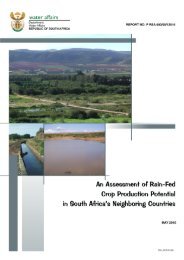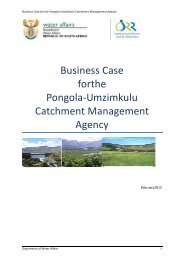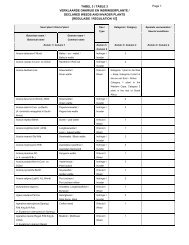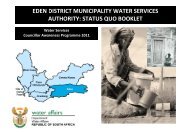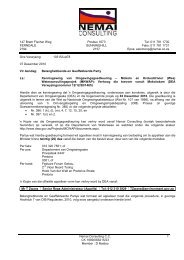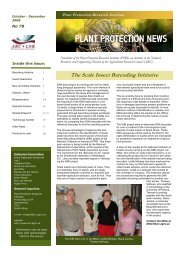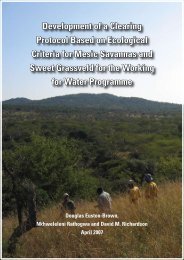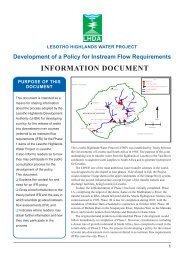Metsi Consultants - DWA Home Page
Metsi Consultants - DWA Home Page
Metsi Consultants - DWA Home Page
You also want an ePaper? Increase the reach of your titles
YUMPU automatically turns print PDFs into web optimized ePapers that Google loves.
Report No 678-F-001<br />
METSI CONSULTANTS: SUMMARY OF MAIN FINDINGS FOR PHASE 1 DEVELOPMENT<br />
deposits rather than on rocks and would be less accessible as food than those that are lost, therefore there would<br />
be a substantial decline in animal food available for fish and birds.<br />
Predicted shifts in the community composition of the aquatic invertebrates in these reaches are indicative of<br />
strongly deteriorating river health. Conditions of slower flows and higher nutrient and algal levels, suited for<br />
colonisation of disease-vector snails (carrying liver fluke), would be enhanced. Blackflies, Simulium damnosum<br />
which attacks man, cattle and poultry, would increase in abundance downstream of Mohale Dam, and Simulium<br />
nigritarse, which is a bloodsucker, preying on poultry, are expected to increase, particularly in the Paray area and<br />
downstream of Mohale Dam.<br />
The native and exotic fishes of the system are expected to be critically affected in Reaches 2, 3 and 7. The<br />
physical presence of the weir in Reach 1 (Matsoku River) is also expected to affect the native fishes, in particular<br />
the highly threatened Maluti Minnow, as well as trout, which would be threatened downstream of the weir, and<br />
may in time disappear entirely. Additionally, trout, large-mouth and small-mouth yellowfish, and rock catfish would<br />
become rare or absent from Reaches 2 and 3. Where relevant in terms of their present distributions, they would<br />
also be moderately to severely reduced in numbers in Reaches 7 and 8. Orange River mudfish are expected to<br />
show a concomitant increase in abundance, particularly in Reach 2 (40-100% or more), and negligible to<br />
moderate in the remaining reaches where they occur.<br />
It is expected that changes in the amphibians would be manifested as species shifts, with a decrease in the<br />
abundance of the Rana group and increases in the Xenopus group. Although more species would decline than<br />
increase in numbers, it is not clear if overall numbers would change to the point that availability of bait would be<br />
affected.<br />
A loss of water-dependent bird life along the Reaches 2, 3 and 7 is anticipated, largely due to the loss of fish.<br />
African black duck, giant kingfisher and hammerkop, all used for meat or medicine, are expected to show<br />
moderate to severe declines in abundance, as are darters, black-headed herons, three-banded plovers and<br />
white-breasted cormorants, which have no social significance. Conversely, increases in some small mammals,<br />
viz. multimammate mouse, red musk shrew and striped mouse, sometimes possibly to pest proportions, are<br />
predicted.<br />
In summary, the loss of resistance and resilience within the system is expected to be clearly apparent (Table 6.2)<br />
in the reaches proximal to the dams (viz. Reaches 1, 2, 3 and 7), and the loss of river resources to riparian<br />
people, and deterioration in the general health of the river, substantial. The capacity to dilute and transport all<br />
pollutants, including faecal contaminants is also expected to decline. The potentially negative consequences of<br />
drinking river water would thus increase sharply. The potential for future development of the catchment areas or<br />
the remaining water and other resources in the rivers would be compromised as additional disturbance of the<br />
rivers or catchments are expected to result in further declines in river condition. Without the construction of<br />
Mashai Dam (Phase 2), however, the impacts of the Phase 1 impoundments are expected to be considerably<br />
ameliorated by large downstream tributaries.<br />
33



